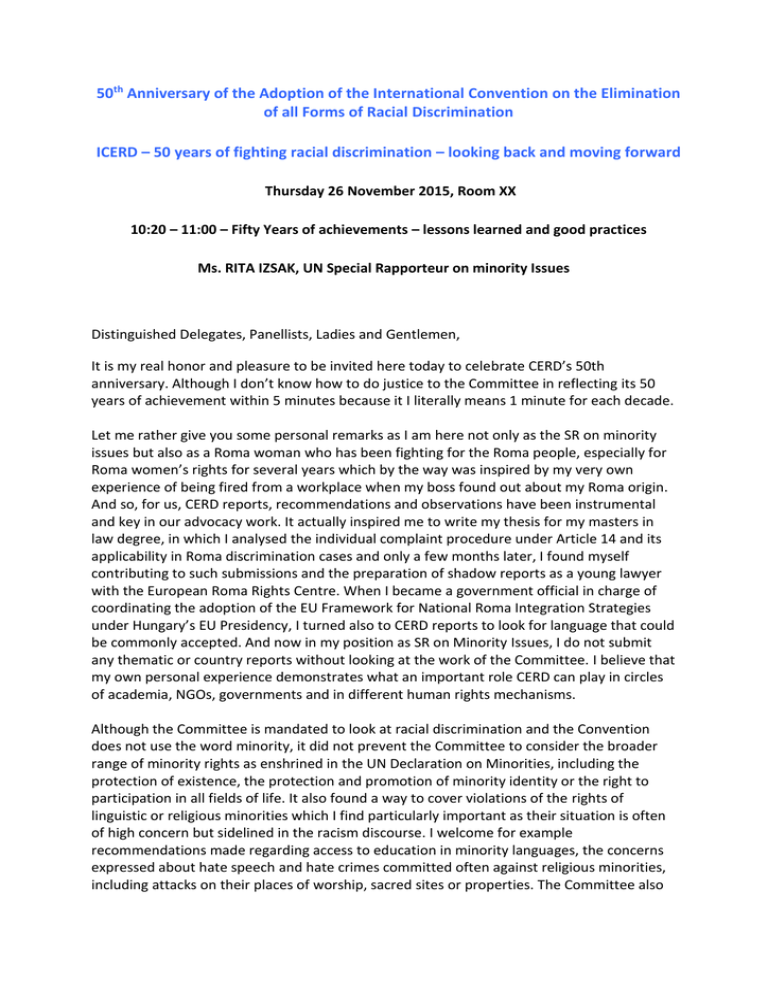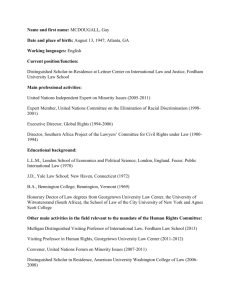50 Anniversary of the Adoption of the International Convention on the... of all Forms of Racial Discrimination
advertisement

50th Anniversary of the Adoption of the International Convention on the Elimination of all Forms of Racial Discrimination ICERD – 50 years of fighting racial discrimination – looking back and moving forward Thursday 26 November 2015, Room XX 10:20 – 11:00 – Fifty Years of achievements – lessons learned and good practices Ms. RITA IZSAK, UN Special Rapporteur on minority Issues Distinguished Delegates, Panellists, Ladies and Gentlemen, It is my real honor and pleasure to be invited here today to celebrate CERD’s 50th anniversary. Although I don’t know how to do justice to the Committee in reflecting its 50 years of achievement within 5 minutes because it I literally means 1 minute for each decade. Let me rather give you some personal remarks as I am here not only as the SR on minority issues but also as a Roma woman who has been fighting for the Roma people, especially for Roma women’s rights for several years which by the way was inspired by my very own experience of being fired from a workplace when my boss found out about my Roma origin. And so, for us, CERD reports, recommendations and observations have been instrumental and key in our advocacy work. It actually inspired me to write my thesis for my masters in law degree, in which I analysed the individual complaint procedure under Article 14 and its applicability in Roma discrimination cases and only a few months later, I found myself contributing to such submissions and the preparation of shadow reports as a young lawyer with the European Roma Rights Centre. When I became a government official in charge of coordinating the adoption of the EU Framework for National Roma Integration Strategies under Hungary’s EU Presidency, I turned also to CERD reports to look for language that could be commonly accepted. And now in my position as SR on Minority Issues, I do not submit any thematic or country reports without looking at the work of the Committee. I believe that my own personal experience demonstrates what an important role CERD can play in circles of academia, NGOs, governments and in different human rights mechanisms. Although the Committee is mandated to look at racial discrimination and the Convention does not use the word minority, it did not prevent the Committee to consider the broader range of minority rights as enshrined in the UN Declaration on Minorities, including the protection of existence, the protection and promotion of minority identity or the right to participation in all fields of life. It also found a way to cover violations of the rights of linguistic or religious minorities which I find particularly important as their situation is often of high concern but sidelined in the racism discourse. I welcome for example recommendations made regarding access to education in minority languages, the concerns expressed about hate speech and hate crimes committed often against religious minorities, including attacks on their places of worship, sacred sites or properties. The Committee also makes frequent recommendations on the right to minority culture as well as on well their access and control over property and land. Citizenship-related concerns are also very important as many minority communities are deprived from their citizenship which makes their status extremely vulnerable in their societies. I am also very pleased that genderrelated dimensions of racial discrimination and intersectional discrimination formed a General Recommendations. But this is really just a fraction of all the cross-cutting concerns that the Committee and myself both have. The General Recommendations are also very valuable source of information when I prepare my thematic studies. For example: o General Recommendation No. 35 on Combatting racist hate speech was highly relevant to my 2015 annual report to the Human Rights Council in March 2015 on Hate speech and incitement to hatred against minorities in the media (A/HRC/28/64) o I regularly refer to General Recommendation No. 27 on discrimination against Roma in my communications to States regarding cases of discrimination against Roma, and it served as an important source when I prepared my recent Global Study on the Protection of Roma presented to the Human Rights Council in June 2015 (A/HRC/29/24) o My latest thematic report to the General Assembly (A/70/212), and also the UN Forum on Minority Issues which took place in this same room during the last two days was dedicated to the issue of Minorities in the Criminal Justice System and General Recommendation No. 31 on the prevention of racial discrimination in the administration and functioning of the criminal justice system was again very useful. Of course, we also need to admit that while we made enormous substantive progress on the normative level, we are yet to see real life changes and improvement in the life of the many disadvantaged minority communities who suffer of racism and prejudices. And this became clear to me during the last two days of the 8th session of the Minority Forum where we listened to dozens of heartening personal testimonies of the minority representatives. And it became clear once again that the root problems are not inappropriate hate speech legislation or eviction orders per se – it is the prejudice and racism that lead to them. And so our real challenge is to change the mind-set of those who carry out violations against minorities because of fear, ignorance, their very own feeling of insecurity or a simple envy of the other. I hope that today’s anniversary and the statements made will lead us to further ideas, commitment and inspiration on how to secure a better and just world for all of us.





